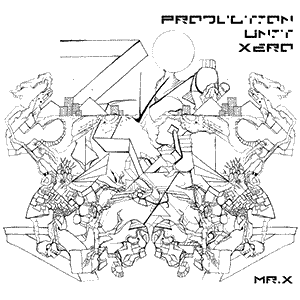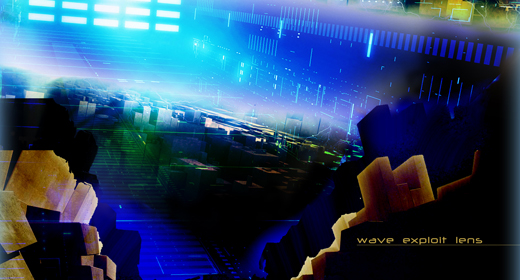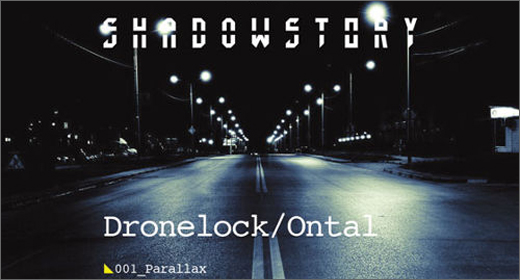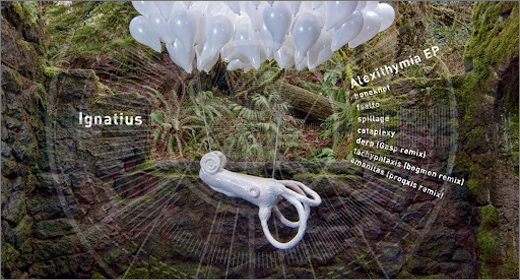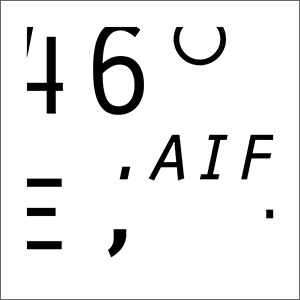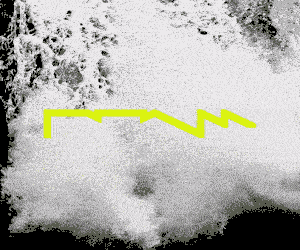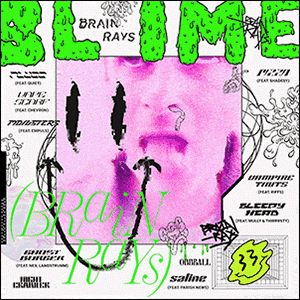An intensely cerebral album, full of cryptic beats and arcane melodies, abruptly issuing its message in a perplexing dialect.
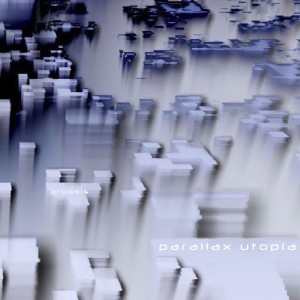
[Listen | Purchase] Full disclosure: I judged this album by its cover. From the artwork to the unpronounceable “Proqxis” to the even less pronounceable track names, I immediately assumed I was getting into some strain of electronic music that involved large amounts of DSP or similar audio trickery. I can’t say I was surprised when I listened to the album. Be warned: appreciating Parallax Utopia requires a lot of patience and a good familiarity with glitch.
Just as Autechre’s later work is sometimes best understood as music for autistic robots, Parallax Utopia works when processed on a similar level of understanding. The songs on the album will not appeal to human emotion, nor will many of them make much rhythmic sense at first. Instead, they read like a broken, imperfect record of an unfeeling metallic world. There are large swaths of unintelligible digital mess, punctuated occasionally by pinpricks of noise or silence. Then there are protracted sections of percussive confusion, guided only by warped hums and vibrations. The whole thing is an inscrutable mess, really. But the fact that the album sounds at times like a haphazard stir-fry of Confield, ideas doesn’t mean beauty can’t be salvaged from it. You just have to listen the right way: either paying little to no attention, or paying as much attention as possible.
Let’s start with the latter: a perusal of the architecture of Parallax Utopia is one that requires dedication, probably more than the average listener has. But since this is an IDM album, I’ll give potential fans the benefit of the doubt. Parallax Utopia, again, is a confounding maze of tempo changes, unquantized flourishes of percussion, and abrupt starts and stops – all of which can be quite rewarding if followed diligently. “Amoeba Dot Leg” and “Observation Still Floating” work this way. The first impression that “Observation Still Floating” makes is jarring, but after a few plays the clutter morphs into a pleasing arrangement. There are tons of nice rhythmic moments on the album, when all the clicks and pops finally fit into place to form an impossibly smooth groove. Those moments are rewarding, and fortunately, most of the songs on the album are set up so that some sort of intelligible beat eventually emerges. And when that moment arrives, it’s pretty damn cool.
The other way, listening to Parallax Utopia just as background music, is effective when the above strategy does not work. Some cuts sound borderline aleatoric, like the album’s starters, “Light of Dawn” and “Junmai Daiginjo.” On my first go, I was inclined to say, “What the hell is this?” as are most people who discover this album, but even after becoming acquainted with the album’s dialect, I still don’t know what the hell is going on. Which is why paying so little attention to it works, because you’re treating the circuitous, misleading rhythms as non-rhythmic elements, another part of a formless wall of texture. It’s much more enjoyable this way, texture being the key word. “8271,” “Four Square,” and “ffTdrupac” are all similar – frustrating on a micro level, and much less so when sufficiently zoomed out. Tracks like this, however, while pleasing enough in this context, still lead me to question their genesis. Are they the results of vast amounts of time with Reaktor or Max/MSP, or are they just lazily randomized processes, extended to arbitrary time point then cut off? Of course, for lack of better information I assume Parallax Utopia is quite a travail, but the nebulous line between these two possibilities isn’t necessarily something to aim for.
The point at which the attentive listening approach is given up for the passive one is a matter of how patient you are and how interesting you find Proqxis’ sonic manipulations. I’m interested in this sort of stuff, and surely plenty of Igloo readers feel the same way. But at the same time, there are loads of electronic music fans who are tired of glitch, and part of me agrees with them. All of this has been done, exhaustively so, 8 years or more before now. What throws the magnitude of Proqxis’ achievement with Parallax Utopia into question is that aside from small pockets of fans (myself included) still interested in this type of music, the time for Parallax Utopia to be associated with any credible artistic movement has passed. So what are we left with? An intensely cerebral album, full of cryptic beats and arcane melodies, abruptly issuing its message in a perplexing dialect. And I mean that in the best way possible.
Parallax Utopia is out now on Buried In Time. [Listen | Purchase]









